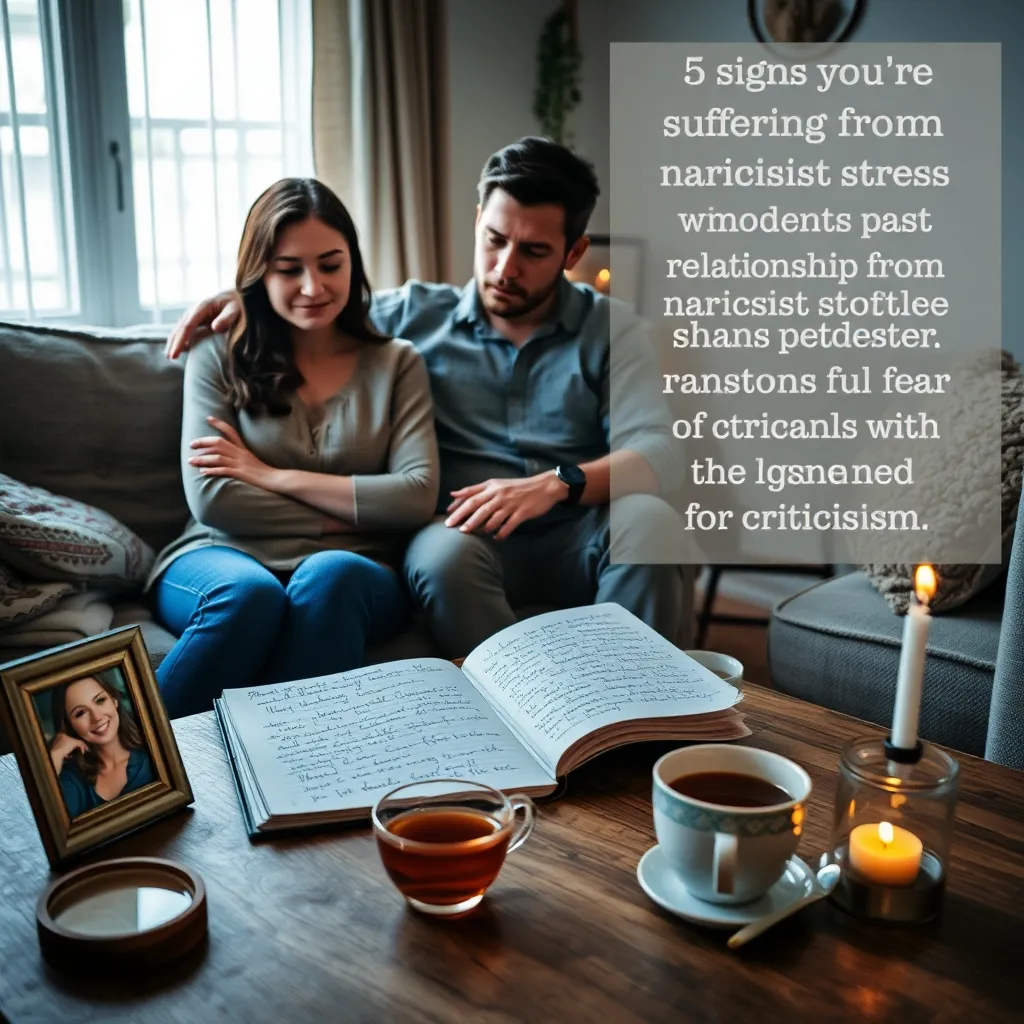Navigating the aftermath of a relationship with a narcissist can feel like emerging from a storm, only to find yourself in unfamiliar territory. Many find themselves grappling with a unique form of stress, often referred to as post-narcissist stress disorder, a condition that can be as complex as it is debilitating. Understanding the nuances of this experience is crucial, not only for your healing journey but also for reclaiming your peace of mind and self-worth. As you delve deeper into this article, you’ll uncover the subtle signs that may indicate you’re experiencing this form of stress.
The scars left by a narcissistic relationship can manifest in unexpected ways, often leaving you questioning your reality and self-esteem. It’s important to recognize these signs, not as a reflection of your weakness, but as a testament to the challenges you’ve faced and the resilience you’re building. We aim to provide you with insights into these signs, offering clarity and validation that you’re not alone in this journey. By identifying these indicators, you empower yourself to take meaningful steps toward healing and reclaiming your narrative.
In this article, we will explore five key signs that may suggest you’re suffering from post-narcissist stress disorder, supported by practical advice to navigate them. Our goal is to illuminate the path forward with understanding and empathy, ensuring you feel seen and supported. With this knowledge, you can begin to rebuild the foundations of your life, equipped with greater awareness and tools for personal growth. Remember, acknowledging these signs is the first step toward a healthier, more empowered future.
1. Persistent Anxiety Around Decisions

After experiencing a relationship with a narcissist, many individuals find themselves grappling with persistent anxiety around even the simplest decisions. This anxiety often stems from a past where their choices were constantly criticized or dismissed, leading to a loss of confidence in their own judgment.
For example, you might feel a heightened sense of stress when deciding what to wear or what to say in social situations. This is because a narcissistic partner may have conditioned you to doubt your instincts, creating a cycle of self-doubt and fear of making mistakes.
In such scenarios, it’s crucial to remember that it’s okay to take time to rebuild your trust in your own decisions. Therapists often suggest starting with small, low-stakes decisions to gradually restore your decision-making confidence.
Another useful approach is to seek feedback from trusted friends or family members who can provide reassurance and support. Recognizing that this anxiety is a response to past trauma can be the first step towards healing and regaining your autonomy.
2. Heightened Fear of Criticism

Experiencing a heightened fear of criticism is another common sign of post-narcissist stress disorder. After enduring a relationship where every move was scrutinized, it’s natural to become overly cautious about how others perceive you.
Imagine being at work and hesitating to share your ideas during a meeting, worried that any feedback might feel like a personal attack. This fear can stem from past experiences where criticism was used as a tool for control rather than constructive feedback.
To begin healing, it’s crucial to recognize that not all criticism is meant to harm. Seeking feedback from trusted friends or colleagues can help rebuild your confidence and provide a more balanced perspective.
Renowned psychologist Dr. Elaine Aron suggests that practicing mindfulness can also be beneficial. By staying present, you can better differentiate between helpful and harmful feedback, reducing anxiety over criticism.
It’s important to remember that healing from past trauma is a journey that requires patience. As you grow to trust your instincts again, the fear of criticism will gradually diminish, allowing you to express yourself more freely.
3. Emotional Detachment in Relationships

Experiencing a relationship with a narcissist often leads to a profound sense of emotional detachment in future relationships. You may find yourself withdrawing or feeling numb, unable to connect deeply with a new partner, out of fear of repeating past trauma.
In many cases, this detachment stems from a need to protect oneself from potential pain. It’s common to avoid vulnerability to prevent getting hurt again, but this can also hinder the development of meaningful connections.
Consider the story of Jenna, who struggled to trust her new partner after leaving a narcissistic relationship. She realized that her emotional walls were preventing her from experiencing genuine love and decided to actively work on opening up.
One effective way to begin addressing this detachment is to take small, intentional steps toward vulnerability. Practicing open communication with your partner can gradually rebuild trust and intimacy, creating a safer emotional environment.
4. Constant Need for Validation

When recovering from a relationship with a narcissist, it’s common to experience a constant need for validation. You may find yourself frequently doubting your self-worth, seeking reassurance from friends or partners to fill the void left by the narcissistic abuse.
This need can stem from years of manipulation where your feelings and opinions were often dismissed or devalued. In these situations, even everyday decisions can feel overwhelming without external approval, as you’ve been conditioned to second-guess yourself.
Consider the story of Emily, who found herself asking her partner for validation after every small achievement. Emily realized she was using her partner’s approval as a measure of her own value, a habit formed during her past relationship with a narcissist.
Experts suggest building a strong support network that encourages self-reliance and self-affirmation. Engaging in activities that reinforce your self-esteem, such as volunteering or pursuing hobbies, can be incredibly empowering.
Ultimately, recognizing this need for validation as a remnant of past trauma is a significant step toward healing. By fostering self-love and independence, you can gradually reclaim the confidence that was eroded by the narcissistic relationship.
5. Recurring Flashbacks of Past Conflict

Experiencing recurring flashbacks of past conflict can be a disorienting experience, often pulling you back into moments you wish to leave behind. These flashbacks might be triggered by a familiar scent, a specific phrase, or even a song that played during a heated argument, making it difficult to move forward.
It’s not uncommon to find yourself reliving arguments in your mind, wondering if there was something more you could have done. This mental replay is your mind’s way of trying to make sense of the chaos, yet it often hinders the healing process by keeping you anchored to the past.
In the midst of these flashbacks, it’s crucial to remind yourself that you’re no longer in that situation, and you have the power to create new, healthier experiences. To break free from this cycle, consider practicing mindfulness techniques, such as deep breathing or meditation, which can help ground you in the present moment.
Seeking support from a therapist can also offer valuable insights, as they provide strategies to manage these intrusive memories effectively. Engaging in therapy allows you to unpack these experiences in a safe environment, facilitating a deeper understanding and the ability to let go.
Remember, overcoming the grip of past conflicts is a journey, and it’s okay to seek help along the way. By acknowledging and addressing these flashbacks, you empower yourself to reclaim your peace and pave the way for healthier relationships in the future.
Conclusion: Creating Beautiful Outdoor Spaces
Navigating the aftermath of a relationship with a narcissist can be challenging, but recognizing the signs of Post-Narcissist Stress Disorder (PNSD) is the first step toward healing. In this article, we explored five key indicators: lingering self-doubt, hyper-vigilance, emotional numbness, difficulty trusting others, and recurring flashbacks of past experiences. These insights illuminate the profound impact a narcissistic relationship can have on your emotional well-being.
To start your healing journey, consider reaching out to a therapist who specializes in trauma recovery. This immediate step can provide you with the guidance and support necessary to rebuild your confidence and reclaim your happiness. Remember, healing is a gradual process, and seeking help is a courageous move toward a brighter future.
We invite you to bookmark this article as a handy guide whenever you need to revisit these vital concepts. As you continue on your path to recovery, remember that relationship success is attainable. With time, patience, and the right support, you can cultivate healthier, more fulfilling connections. Empower yourself today by taking that first step and keep this resource close as you journey toward a happier, more balanced life.
